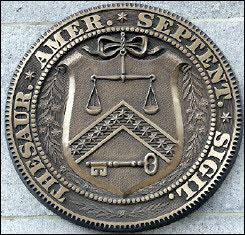 |
 |
 |
 News from Around the Americas | February 2006 News from Around the Americas | February 2006  
US Defends Actions in Cuba Sanctions Row with Mexico
 AFP AFP


| | The US Treasury seal. Assistant US Treasury Secretary Tony Fratto defended US actions in pressuring a US-owned hotel in Mexico earlier this month to expel Cuban officials, creating a diplomatic row. (AFP/Brendan Smialowski) |
The United States defended its actions in pressuring a US-owned hotel in Mexico earlier this month to expel Cuban officials, creating a diplomatic row.

A US Treasury official said the US embargo on Cuba applies to American firms operating anywhere in the world, and that the "alert" it issued over the presence of Cuban officials at the hotel was a normal part of US law enforcement.

"We're not looking to irritate our friends in Mexico, but the law is clear," Assistant US Treasury Secretary Tony Fratto told reporters.

"US firms must not engage in activities with the government of Cuba."

Fratto added that "Wherever US firms operate, they have to operate within the scope of US law."

The comments came after the first known incident in which Washington acted to enforce the sanctions in the Helms-Burton Act against a US firm operating in a foreign country.

The hotel, the Maria Isabel Sheraton owned by US-based Starwood Resorts and Hotels, expelled a delegation of 16 Cuban officials who had been staying at the hotel. The Cubans were to meet with executives of US companies including Exxon Mobil and Caterpillar.

Fratto said the Treasury's Office of Foreign Assets Control, which administers US sanctions, sent "an alert that there is a potential for a US firm to find themselves outside the law."

This warning, he said, "went above and beyond the natural responsibility you would expect from a law enforcement agency."

But the move created political shock waves in Mexico as Mexican legislators and others expressed outrage at the actions.

After the expulsion, Mexican authorities moved to close the hotel for code violations and for lacking a braille menu. But the closure was later halted by a judge.

Officials in Mexico City said the country was enforcing only Mexican laws. | 
 | |
 |



